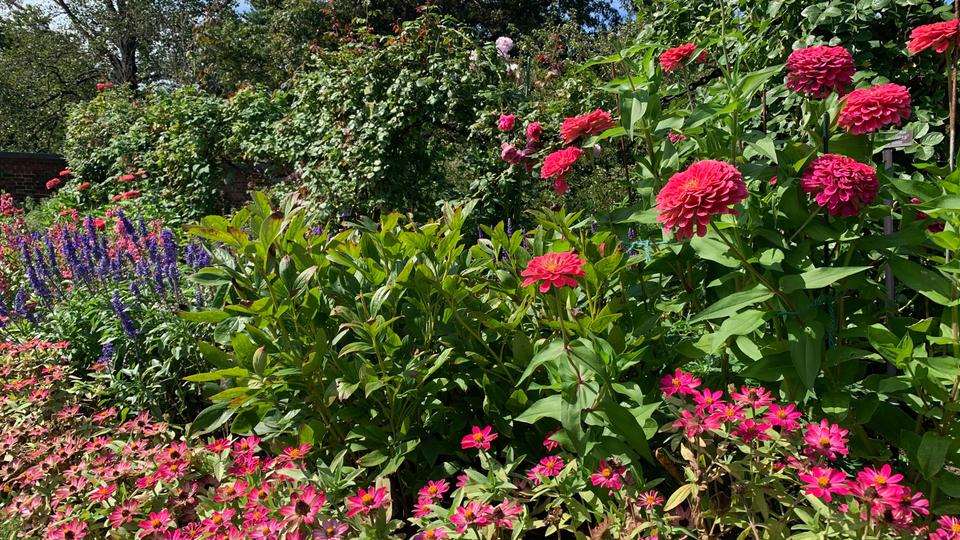Amendment: Organic matter such as compost or manure added to soil to improve its fertility, drainage, water retention or structure
You may venture a guess as to what ‘heirloom’ and ‘biennial’ mean, but do you know about ‘deciduous’ trees and ‘stratification’? This file photo shows a mixed garden border blooming in Old Westbury, NY. (Jessica Damiano / AP) When thumbing through seed catalogues or plant-care manuals, you’re likely to encounter at least some descriptions that elude you.
So here's a cheat sheet to help navigate the offerings – and maybe impress your gardening friends.
Aerate: Poking holes into compacted soil with a garden fork or aeration machine to facilitate the flow of oxygen to plant roots.
Amendment: Organic matter such as compost or manure added to soil to improve its fertility, drainage, water retention or structure.
Annual: A plant that completes its lifecycle in one year, regardless of climate.
Bare root: Plants, typically roses, trees and shrubs, that are dug out of the ground and sold without soil or containers.
Biennial: A plant that completes its lifecycle in two years.
Bolting: Premature flowering of crops like lettuce and beets that renders them bitter or otherwise lessens their quality.
Botanical name: The name assigned to a plant using the Latin-based terminology developed by the Swedish botanist Carolus Linnaeus in the 1700s. Using a plant’s botanical name (also referred to as its “scientific name”) eliminates the risk of confusing it with other plants.
Broadcast: Spreading seeds over a large area, either by hand or machine, instead of planting in rows.
Cloche: A traditionally bell-shaped item placed over plants to protect them from insect or frost damage.
Cold frame: An enclosure placed around plants to create a greenhouse effect and extend the growing season.
Common name: A nickname used in certain circles or geographical regions to describe a plant. Because different plants can share a common name — and one plant can have several – their use can confuse gardeners.
Companion planting: Grouping specific plants together based on the benefits they provide for each other. Those benefits can include attracting pollinators, deterring pests or serving as a living trellis.
Deadheading: The practice of removing spent – or dead – flowers from a plant to encourage repeat blooming, prevent self-sowing or simply keep plants looking tidy.
Deciduous: Plants, trees or shrubs that lose their leaves in autumn or winter.
Direct sow: Planting seeds directly into the garden rather than starting them in containers indoors and transplanting them outdoors later.
Ephemeral: A plant that emerges and fades relatively quickly, often in spring.
Evergreen: Plants, trees or shrubs that do not lose their leaves in autumn or winter but remain green year-round.
Foliar feeding: Applying liquid fertiliser directly to leaves rather than soil.
Germination: The initial growth of a sprout from a seed.
Harden off: The process of gradually acclimating a plant to a different, usually harsher, climate, such as outdoors from indoors, in order to increase its resiliency.
Heirloom: A plant in its original form that has not been hybridized or cross-pollinated with other species or varieties. Heirloom seeds reliably produce plants that “grow true” or hold the same characteristics as the plants from which they were collected.
Hill: The practice of mounding soil up against new above-ground growth, as is done with potato plants.
Hybrid: A plant variety that has been deliberately cultivated in a controlled setting, usually by cross-pollinating, in order to acquire new, desirable characteristics such as bloom colour, disease resistance, fragrance, size, hardiness, taste or shelf life, among others.
Naturalise: The practice of scattering seeds or bulbs in such a way that they either appear to have spread naturally or, in areas such as the lawn, where they are allowed to spread without boundaries.
Organic matter: Non-synthetic material, such as decomposed plants and animals, manure, compost and leaf mould, used to improve the fertility, structure and other attributes of soil.
Perennial: Plants with a lifecycle that is longer than two years. Perennials may die back to the ground over winter and return year after year or remain evergreen throughout their lifespan.
pH: In gardening, the pH scale determines the acidity or alkalinity of soil, compost and water. The lower the reading, the more acidic the soil; the higher the reading, the more alkaline. A reading of 7.0 is considered neutral.
Pinching: The practice of using your thumb and index finger to remove small shoots and stems, usually to encourage the growth of side shoots.
Scarification: Scratching, cutting, nicking or otherwise lightly damaging the hard surface of a seed to facilitate germination.
Self-seeding: A term used to describe plants that spread by dropping seeds onto the soil around them. Those seeds germinate, root and grow into more plants. Also called “self-sowing.”
Side dress: To sprinkle a line of granular, powdered or pelleted fertilizer (or other amendments) alongside a row of plants rather than incorporate it into the soil or planting hole.
Stratification: The process of exposing seeds or bulbs to cold temperatures, typically in a refrigerator or freezer, to emulate the outdoor winter conditions necessary for successful spring germination.
Top dress: To apply fertilizer or amendments like compost or manure directly to the soil above and around plants.
Wet feet: Wet roots, usually result from poorly draining or oversaturated soil.
Xeriscaping: The use of drought-tolerant plants in the landscape for water-conservation purposes. Also called “water-wise gardening.”
Source: AP









